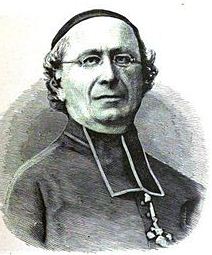I wrote this post a few years ago, and over time, I’ve gained a new understanding of Bishop Hailandiere, who died on this date, May 1st, 1882. He is the bishop we either call crazy, or the one we love to not love… So, call me crazy, but over the years, I’ve learned to respect anyone who put up with the hardships of Indiana in the 19th century, even if they perhaps attempted to live the life they had been accustomed to in France, or became controlling, or if they thought that everyone who professed to be a Catholic in the State of Indiana were subject to himself. Or even if, and I have included some other information from historians who have “named” some of Hailandiere’s “problems”, they suffered from one or another mental illnesses.
Bishop de la Hailandiere, the man who was “second choice” to be the second Bishop of Vincennes. The man who “locked up” a future saint because she refused to submit, in his opinion, to his authority. Hailandiere, who, perhaps because of his Gallican background believed that the bishop was the final authority and, perhaps, the only authority.
According to Fr. Robert Gorman, former archivist of the Archdiocese of Indianapolis, Hailandiere viewed his priests as “religious subjects”. This is not to say that he did not “respect” them, but I think it says that Hailandiere saw them “in their place”. The same way he viewed Mother Theodore, in my opinion, not as inferior, but as a “subject” to his own place as bishop and therefore, the final word, although certainly, in the 19th century, women were considered subservient. The priests of the diocese and Mother Theodore herself understood the situation and although they disagreed with the bishop, they did not ‘disrespect’ him. Some, like Michael Shawe and others, left the diocese. Others appealed to higher authorities, either to Rome or the other bishops and Bishop Hailandiere’s disagreements with Notre Dame founder Edward Sorin are also well documented. A war of egos, perhaps.
Historian Joseph M. White, in his article for the U.S. Catholic Historian in 2011, wrote:
With so many personal problems afflicting him, Hailandiere lacked the ability to serve as a bishop. His pattern of behavior, as revealed in the carefully researched accounts of Mary Borromeo Brown, Charles Lemarie and Mary Theodosia Mug and the transcribed documents submitted for Mother Theodore’s canonization give evidence for the following: megalomania, as only his notion of a bishop’s absolute authority mattered in dealing with other leaders; bipolar disorder, in the mood swings from moments of charm to explosive and prolonged displays of temper; obsessive-compulsive behavior, as revealed in a preoccupation with minor details; attention deficit disorder, noted when he would favorably grant a request yet not follow through to implement it; and anger-management problems as revealed in frequent displays of temper and extended harangues. The bishop’s mental health has usually not been discussed in historical accounts but needs to be included in assessing his record. But in this favor, he correctly determined that his behavior was beyond control, and he needed to resign. 1
Hailandiere was born in Combourg, in the Archdiocese of Rennes on May 3, 1798. He was ordained a priest at Paris on May 28, 1825. He heeded the call from Servant of God, Simon Gabriel Brute to come to Indiana and he was one of the 19 who sailed to America in 1836. Brute appointed him Vicar general of the Diocese of Vincennes. Hailandiere was named coadjutor of Vincennes on May 17, 1839. Consecrated at Paris, August 18, 1839, by Bishop Charles Forbin-Janson of Nancy, assisted by Bishop Louis Blanquart de Bailleuil of Versailles and Bishop Jean Louis la Mercier of Beauvais. He resigned on July 16, 1847, and returned to France.
He died on this day, May 1, in 1882. His body was brought from France and interred in the Old Cathedral, Vincennes, on November 22, 1882.
- White, Joseph M. (2011). Path to Sainthood and Episcopal Leadership: Mother Theodore Guerin and Bishop Célestin de la Hailandière in History and Memory. U.S. Catholic Historian. 29.[↩]